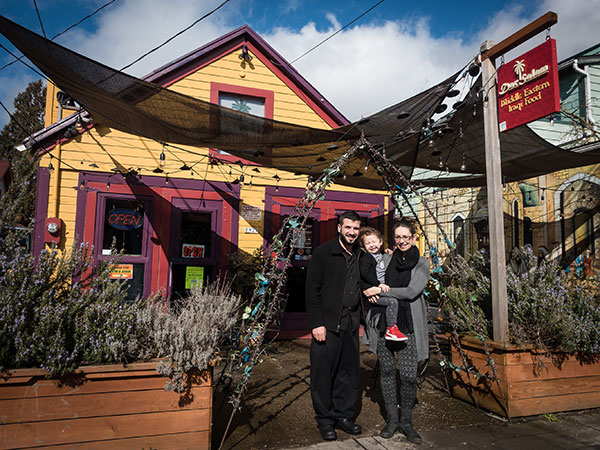By Brian Burk, CNA Media Team
Editor’s note: The space confines of a printed newspaper limited the ability of CNews’ March issue to explore how the Sahibs are affected by recent executive orders, and how they appreciate the Concordia community’s support. Below, Brian tells you “the rest of the story.”

Reverberations from executive orders on foreign entry to the United States – commonly referred to as the “travel ban” or the “Muslim ban” – are being felt in Concordia.
Inside a former carriage house on Alberta Street, Iraqi-born Ghaith Sahib and wife, Tiffany, run DarSalam, one of two Portland restaurants they own. Dedicated not only to feeding but also educating patrons about Iraqi history and culture, the restaurant evolved from a food cart the Sahibs launched in 2011 after relocating to Portland from Amsterdam, where they had met and married. Tiffany is a Portland native and Ghaith, who left Iraq after barely surviving a 2005 car bomb attack, sought to re-establish himself in the United States. He is now a U.S. citizen.
In January an executive order was issued to restrict travel to the United States from seven predominantly Muslim countries, including Iraq. The order also suspended the U.S. Refugee Admissions Program for 120 days. Later, a second order was issued that removed Iraq from the list of restricted countries.
The executive orders have disrupted business and family life. A Syrian employee has been unsuccessful in bringing his wife and brother into the United States. “He has been told by organizations that, by luck, he’ll see his wife in two years,” Ghaith reported. The Sahibs also have relatives in refugee camps abroad whose immigration status is tenuous.
Ghaith’s parents are currently in Germany visiting their eldest son. Although his parents have recently become U.S. citizens, Tiffany and Ghaith are concerned there will be complications when they re-enter the country. “They speak very little English,” Tiffany pointed out. “They can’t really defend or explain themselves.”
The Sahibs moved to Portland in 2009, later joined by his parents and two of his siblings, who help at the restaurant. Not including family members, they employ about 13 people on a part-time basis at the Concordia location.
Although adjusting to life in the United States was difficult, Ghaith said he found Portland welcoming. While initially hesitant to label DarSalam an Iraqi restaurant, the Sahibs were surprised by how little this mattered to their customers. They even attracted an unexpected clientele: American veterans of the Iraq war. “They have certain nostalgia for the culture,” Tiffany said.
One such veteran is Sean Davis, commander of neighboring American Legion Post 134. “Our friendship goes back years,” said Sean, who, like Ghaith, was injured in the war. “As soon as they opened the restaurant, I went over there. Ghaith was there working every single day, so I got to know him and his parents because I spoke a little bit of Arabic.
“I respect people who work hard and I respect people who love their families,” Sean explained. “He wants to make where he lives a better place.”
“When we heard about the ban, we were shocked,” Ghaith said. “We felt worry. We felt shame. We felt like people don’t like us.” Even after the second order excluded Iraq from the list of restricted countries, his tension was not resolved. “For me it still hurts,” he said.
Amidst the national immigration controversy, the local community has rallied around DarSalam. “We love Portland,” Ghaith said. “We got support from neighbors, from friends, from customers. They tried to show us love and encourage us not to give up. It was a really good experience.”
To those who would argue the executive order is necessary for public safety, Ghaith said, “I don’t agree at all. Refugees have already had to fill out so many applications, and there have been so many security checks. Refugees have already suffered. They need help.”
The Sahibs have an energetic three-year-old named Malaika, who played with restaurant staff while her parents spoke to Concordia News.
She’s half-Iraqi and half-American,” Ghaith said. “When she grows up she’ll be proud of who she is. There are many Vietnamese refugees who have been here for 40 years, and now they have generations of kids who are doing great things. So, when it’s proposed to make the country safe by stopping refugees, this is not the answer.”
After several years of building their business, raising a young child and continuing to adjust to an evolving political landscape, the Sahibs are ready for a break. They’ll soon be travelling to Mexico for a brief vacation. Tiffany used to live in Mexico, and Ghaith is excited about introducing Malaika to a new culture.
But with their excitement comes trepidation about the final stage of the trip, according to Tiffany.
“It will be interesting to see what coming back in is like.”